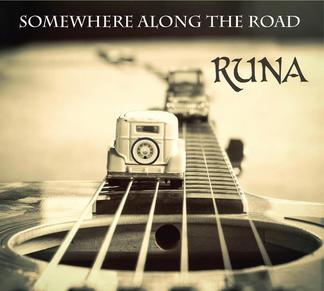
Somewhere Along the Road is Runa’s third release and it is tight and well-engineered with crisp vocals and nicely separated instruments. Best of all, Runa sounds like no one else.
In a market saturated by Clannad, the Chieftains, Maire Brennan’s solo work, Enya, Celtic Women and all the rest, being pleasantly surprised is no easy achievement. However, a pleasant surprise is precisely what awaits the first-time listener. It also awaits the ten-time listener because the material and the performance do not grow stale or tiresome.
This is especially surprising when considering that Fionán de Barra has written extensively with Maire Brennan and has toured with Clannad and his influence on Runa’s sound is profound in that he co-arranged, engineered, mixed and mastered the present album as well as playing and singing on it. Despite Fionán’s recording and touring with the giants of Celtic music, Runa’s sound is fresh and vibrant and most assuredly worthy of attention.
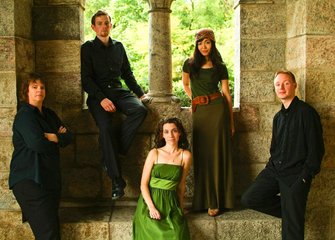
While known for his sound designing and producing, Dublin-born Fionán’s guitar work is impressive. There is a definition and punctuation in his playing that is very intriguing. He plays percussively and melodically and there is sometimes a flamenco feel to his attack.
It was Karine Polwart who composed “The Dreadful End of Marianna for Sorcery” and she has created a tale worthy of a novel. The music develops alongside the story and the introduction and disappearance of the various instruments heighten the interest…and tension. As when Cheryl Prashker’s percussion snaps into the music and creates a growing feeling of menace in duet with de Barra’s guitar. Isaac Alderson’s flute appears and recedes, as does Tomoko’s violin.
The conflict is given full voice and Shannon’s vocals carry above the struggle between flute and violin. The guitar carries the musical side of the story and Cheryl’s pulsating percussion keeps the listener riveted. The tale has an unseen twist and the conclusion of the story, with its driven music and Fionán de Barra’s almost flamenco guitar punch, leaves the hearer almost breathless.
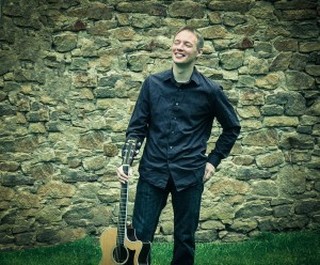
It is opened by guitar and violin. Cheryl’s exquisitely subtle percussion is a picture perfect underscore for the play between guitar and violin.
Cheryl Prashker was born and raised in Montreal and studied classical percussion at McGill University there. She has spent many years in New York City developing her skills of playing Celtic as well as Middle Eastern music. That particular style of percussion is a stunning addition to her experience and is another example of Runa bringing unique and varied elements and styles in harmony to create something very refreshing.
“A Stór, a Stór, a Ghrá” follows with throbbing guitar and bodhrán and duet vocals by Shannon Lambert-Ryan and David Curley. After the first vocal pass, a Celtic version of flamenco palmas is added, disappears and re-appears. Fionán’s vocals are added for great layering.
Again the trading between Fionán and Tomoko provide lively counter-play but it is their unison playing that is the most delightful –and this occurs often during the album.
Below is a YouTube link to "Lowlands of Holland" performed by Runa.
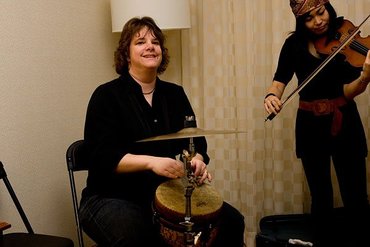
A leader of his own band Slide Ireland, David Curley is a fine instrumentalist of mandolin, banjo, guitar and bodhrán. He fits exceedingly well as a touring and recording member of Runa. His talents add a graceful resonance to the sound of the band.
Chicago-born Isaac Alderson began studying Irish music when he was only 13 years old. He studied with the Irish masters and at the 2002 Fleadh Cheoil, Isaac became the All-Ireland Senior Champion on three instruments: whistle, uilleann pipes and flute.
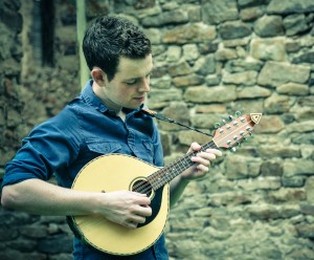
Tomoko Omura is another happy surprise to be found in Runa. Born in Shizuoka, Japan, Tomoko began playing violin at the age of four and eventually studied at Berklee College of Music in Boston. She is an innovative composer and a bandleader on her own. Her solo album Visions has been warmly received.
Classically trained, Tomoko moved to the US in pursuit of her jazz interests. In 2004, she won the “Roy Haynes Award.” She tours and performs with her own band and in the bands of others. It is this wide exposure and experience in music that brings a unique addition to Runa. There is a jazziness and a rock-sense (one thinks of Eddie Jobson and Jean-Luc Ponty) and ever-so-slight hints of Asian modalism in her musical vocabulary. She very well may be Runa’s secret weapon.
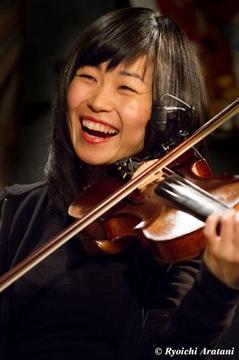
Again, Shannon Lambert-Ryan keeps the clarity of her diction despite the breakneck tempo of the song. This is another stand-out feature of Runa as has been mentioned twice already. Simply said, Shannon’s voice is rapturous. Her voice is full of color and nuance and the listener can simply not hear enough of her.
“Farewell to Tarwathie/The Last Leviathan” is a binary piece concerning, on the one hand, a sailor who is setting sail in search of wealth by means of hunting whales and, on the other, the viewpoint of the whale being hunted; the last of its kind. The melody is carried by guitar and violin again with the subtlest of percussion. The song ends from the viewpoint of the young whaler about to sail from Tarwathie. Now that his prey has been given voice, his voyage is not so romantic as at first glance.
“The Maid That Sold Her Barley” is another vocally demanding piece that Shannon carries off beautifully. Again, it is violin, guitar and percussion that carry the song at a quick gait. The speedy imagery is well-suited to a song that tells of a hasty and lusty man who tries to seduce a young farmer’s daughter only to be out-spoken and out-witted by the clever and witty tongue of the maiden. Shannon carries it so well.
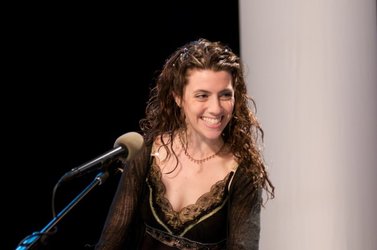
“Somewhere Along the Road/Toss the Feathers/The Mason’s Apron” is a suite of interconnected guitar solos that move from a raw, slow piece to more lively and energetic pacing. Fionán de Barra’s guitar work does not disappoint.
“Mae Colven” follows after and is initiated by Tomoko’s strumming of the violin—a very nice opening move. Another tale of a false nobleman and a trapped woman who outwits him is given full picture by the fighting and fleeing violin work of Tomoko Omura. She has great skill in painting beautiful sonic landscapes and portraits.
“The Parting Glass” is a very old traditional Irish and Scottish song. It was a song of farewell after a gathering of friends. The Scottish version is a bit faster while the Irish version is slower paced and better suited to the reluctant parting of good comrades. It is sweetly sung, almost sadly, and the drawn out violin carries the emotion of delaying departure as long as possible.
“Allison Cross” is an entertaining piece about a young man whom a witch is trying to entrap. He defies her advances and is turned into a frog. Finally a princess returns him to his “proper shape” and he maintains his defiance. Fun stuff this.
“Amhrán Mhuighinse” is the final track. It begins with Shannon’s solo voice and she is later joined by David and Fionán. The vocals continue until 3:15 when are joined by the violin. The vocal layers and the simple violin are almost agonizing in the realization that the album is about to conclude. The vocals fade and the violin lingers… but all-too-briefly.
Most of the songs on Somewhere Along the Road are traditional Irish pieces. Shannon once said that they like to take traditional Irish songs and Celt them up a bit. Whatever their approach, Runa has created a freshness and vitality that is surprising. The most surprising thing of all is that they have not gotten even greater attention than they already have. That will change.
Find this release at http://www.cdbaby.com/cd/runa13
 RSS Feed
RSS Feed
